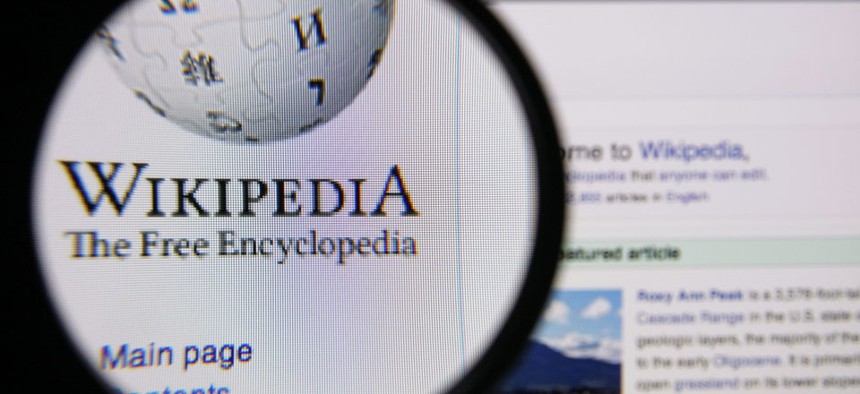Is Anyone at Your Agency Editing Wikipedia?

Gil C/Shutterstock.com
Here’s what they should know.
A Twitter bot recently set up to tweet out when people anonymously edit Wikipedia from congressional IP addresses has inspired a conversation among feds about how agencies should approach the online encyclopedia, according to a DigitalGov blog post.
After anonymous edits were broadcast by the Twitter bot and picked up by news outlets (including this one), Wikipedia last week issued a 10-day ban on edits coming from computers using the IP address associated with the House of Representatives, citing abuse and pointing to a series of questionable edits -- some of which I’ll list at the end of this post for your entertainment.
“The lesson here is that there is undoubtedly public interest in what is coming from the IPs of the federal government, and there is the potential for public controversy if it happens to be anonymous PR-type work (even if it’s just a small number of well-intentioned edits that didn’t stick) or worse,” wrote Dominic McDevitt-Parks, a digital content specialist and "Wikipedian-in-Residence" at the National Archives and Records Administration.
McDevitt-Parks explained how to find out if anyone at a particular agency is editing Wikipedia:
You’ll need to find out the IP range(s) associated with your agency or office. There are external registries listing IPs associated with organizations, but you are likely to have better accuracy by going to your IT department (try to find someone who works on network management or operations). With an IP range in hand, you can use XTools (an open-source tool on Wikimedia Labs) to search the contributions of all the individual IPs. For added certainty, you can try to find out specific IPs or IP subranges for public terminals or public wifi, if any of your facilities have public Internet access, to filter them out. And note that this method only surfaces anonymous edits, since that is the only time IP addresses are made public on Wikipedia. There could still be someone editing under an account name in your agency doing things that could reflect poorly if the affiliation becomes known.
NARA and the Department of Health and Human Services have issued guidance on how employees should engage with Wikipedia (here and here, respectively).
According to McDevitt-Parks, best practices might include:
- Always use an account and identify yourself when editing Wikipedia on behalf of your agency.
- Abide by Wikipedia’s policies and practices on neutrality, notability and verifiability.
- If there is a potential conflict of interest (for example, an article about your agency), engage in an open dialogue with the Wikipedia community using talk pages and notice boards, rather than editing the article directly.
There is a lot more helpful information in the blog post, and I recommend you just read it: Here’s the link again.
Now, for the edits that got Congress in trouble, according to Joe Miller at BBC News:
One of the acts highlighted was an alteration to the page on the assassination of John F Kennedy, which was changed to say that Lee Harvey Oswald was acting "on behalf of the regime of Fidel Castro".
An entry on the moon landing conspiracy theories was changed to say they were "promoted by the Cuban government".
Another entry, on the Ukrainian politician Nataliya Vitrenko, was edited to claim that she was a "Russian puppet".
The biography of former US defence secretary Donald Rumsfeld was revised, describing him as an "alien lizard who eats Mexican babies".
However the edit that finally brought administrators to ban anonymous edits from the House IP address was made on the entry for media news site Mediaite, describing the blog as "sexist transphobic" and saying that it "automatically assumes that someone is male without any evidence".
Mediaite had previously run a story on the rogue edits from congressional computers.
Happy editing!
(Image via Gil C/Shutterstock.com)
NEXT STORY: The USPS' Hail-Mary Idea: Embrace 3-D Printing






